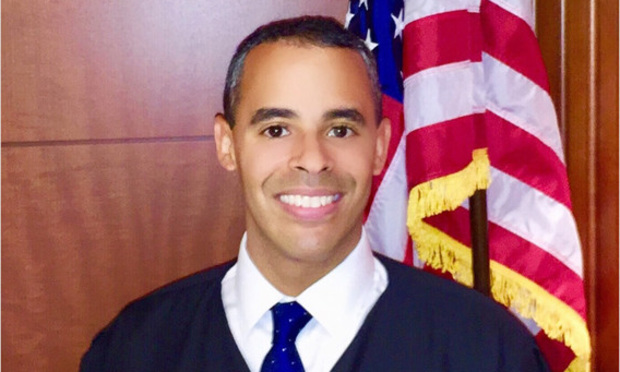Atlanta Municipal Court Launches Program to Aid the Homeless
"We recognize that being mired in the criminal justice system is an obstacle to reclaiming your life and living lawfully," Chief Judge Christopher Portis said. "We aim to see homeless individuals who are actively engaged in the court program return to the community, after treatment, as valued members."
September 25, 2019 at 03:19 PM
2 minute read
 Atlanta Municipal Court Chief Judge Christopher Portis (Courtesy photo)
Atlanta Municipal Court Chief Judge Christopher Portis (Courtesy photo)
Atlanta Municipal Court Chief Judge Christopher Portis has ordered the start of a Homeless Court Program that will include a combination of prescribed treatment, judicial monitoring and coordinated services.
"We recognize that being mired in the criminal justice system is an obstacle to reclaiming your life and living lawfully," Portis said in a news release Wednesday. "We aim to see homeless individuals who are actively engaged in the court program return to the community, after treatment, as valued members."
Portis signed a standing administrative order Tuesday creating what's billed as a problem-solving court similar to those growing around the state for those charged with crimes related to alcohol and drug addiction, mental health issues, delinquent child support payments and family violence.
The new homeless court will handle minor offenses that are "often associated with or committed as a result of homelessness," the order said. Those include, but are not limited to, charges of: pedestrian in the roadway, pedestrian soliciting rides or business, monetary solicitations, pedestrian obstructing traffic, criminal trespass and occupation of a vacant or abandoned building.
The level of supervision may be open to the court's discretion, up to and including daily check-ins for a prescribed period. The program will be run daily through a collaboration of court divisions, including Restore Atlanta.
The new program will be similar to homeless courts operating in other parts of the country, the judge said. The program is based on the American Bar Association's seven guiding principles for homeless courts, which include a combination of prescribed treatment, judicial monitoring, coordinated services, as well as enhanced communication among the various stakeholders.
In addition to aiding the homeless, the new court program will provide a range of support services to address commonly associated challenges such as mental illness and drug abuse, Portis said. He reiterated the municipal court's dedication to providing continuous quality programming to address the multipronged issues of homelessness with the intent to build and enhance public safety.
This content has been archived. It is available through our partners, LexisNexis® and Bloomberg Law.
To view this content, please continue to their sites.
Not a Lexis Subscriber?
Subscribe Now
Not a Bloomberg Law Subscriber?
Subscribe Now
NOT FOR REPRINT
© 2025 ALM Global, LLC, All Rights Reserved. Request academic re-use from www.copyright.com. All other uses, submit a request to [email protected]. For more information visit Asset & Logo Licensing.
You Might Like
View All
Georgia Republicans Push to Limit Lawsuits. But Would That Keep Insurance Rates From Rising?
5 minute read
A Plan Is Brewing to Limit Big-Dollar Suits in Georgia—and Lawyers Have Mixed Feelings
10 minute readTrending Stories
- 1New York Judge Steps Down After Conviction for Intoxicated Driving
- 2Keys to Maximizing Efficiency (and Vibes) When Navigating International Trade Compliance Crosschecks
- 3Houston Law Firm Files $250K Breach of Contract Suit Against 2 Former Lawyers
- 4The Week in Data Feb. 3: A Look at Legal Industry Trends by the Numbers
- 5Mass Tort Cases: Challenges for Plaintiff’s and Defense Counsel
Who Got The Work
J. Brugh Lower of Gibbons has entered an appearance for industrial equipment supplier Devco Corporation in a pending trademark infringement lawsuit. The suit, accusing the defendant of selling knock-off Graco products, was filed Dec. 18 in New Jersey District Court by Rivkin Radler on behalf of Graco Inc. and Graco Minnesota. The case, assigned to U.S. District Judge Zahid N. Quraishi, is 3:24-cv-11294, Graco Inc. et al v. Devco Corporation.
Who Got The Work
Rebecca Maller-Stein and Kent A. Yalowitz of Arnold & Porter Kaye Scholer have entered their appearances for Hanaco Venture Capital and its executives, Lior Prosor and David Frankel, in a pending securities lawsuit. The action, filed on Dec. 24 in New York Southern District Court by Zell, Aron & Co. on behalf of Goldeneye Advisors, accuses the defendants of negligently and fraudulently managing the plaintiff's $1 million investment. The case, assigned to U.S. District Judge Vernon S. Broderick, is 1:24-cv-09918, Goldeneye Advisors, LLC v. Hanaco Venture Capital, Ltd. et al.
Who Got The Work
Attorneys from A&O Shearman has stepped in as defense counsel for Toronto-Dominion Bank and other defendants in a pending securities class action. The suit, filed Dec. 11 in New York Southern District Court by Bleichmar Fonti & Auld, accuses the defendants of concealing the bank's 'pervasive' deficiencies in regards to its compliance with the Bank Secrecy Act and the quality of its anti-money laundering controls. The case, assigned to U.S. District Judge Arun Subramanian, is 1:24-cv-09445, Gonzalez v. The Toronto-Dominion Bank et al.
Who Got The Work
Crown Castle International, a Pennsylvania company providing shared communications infrastructure, has turned to Luke D. Wolf of Gordon Rees Scully Mansukhani to fend off a pending breach-of-contract lawsuit. The court action, filed Nov. 25 in Michigan Eastern District Court by Hooper Hathaway PC on behalf of The Town Residences LLC, accuses Crown Castle of failing to transfer approximately $30,000 in utility payments from T-Mobile in breach of a roof-top lease and assignment agreement. The case, assigned to U.S. District Judge Susan K. Declercq, is 2:24-cv-13131, The Town Residences LLC v. T-Mobile US, Inc. et al.
Who Got The Work
Wilfred P. Coronato and Daniel M. Schwartz of McCarter & English have stepped in as defense counsel to Electrolux Home Products Inc. in a pending product liability lawsuit. The court action, filed Nov. 26 in New York Eastern District Court by Poulos Lopiccolo PC and Nagel Rice LLP on behalf of David Stern, alleges that the defendant's refrigerators’ drawers and shelving repeatedly break and fall apart within months after purchase. The case, assigned to U.S. District Judge Joan M. Azrack, is 2:24-cv-08204, Stern v. Electrolux Home Products, Inc.
Featured Firms
Law Offices of Gary Martin Hays & Associates, P.C.
(470) 294-1674
Law Offices of Mark E. Salomone
(857) 444-6468
Smith & Hassler
(713) 739-1250








